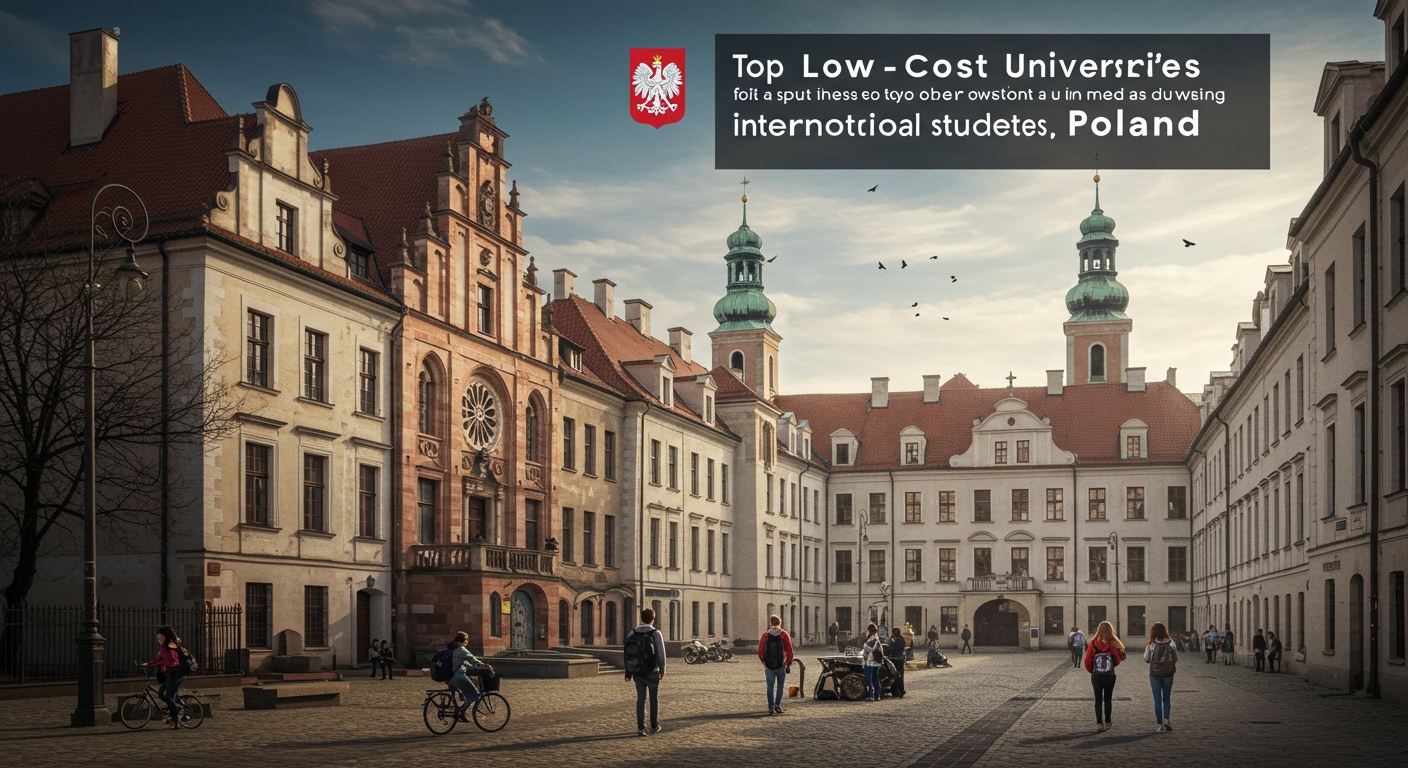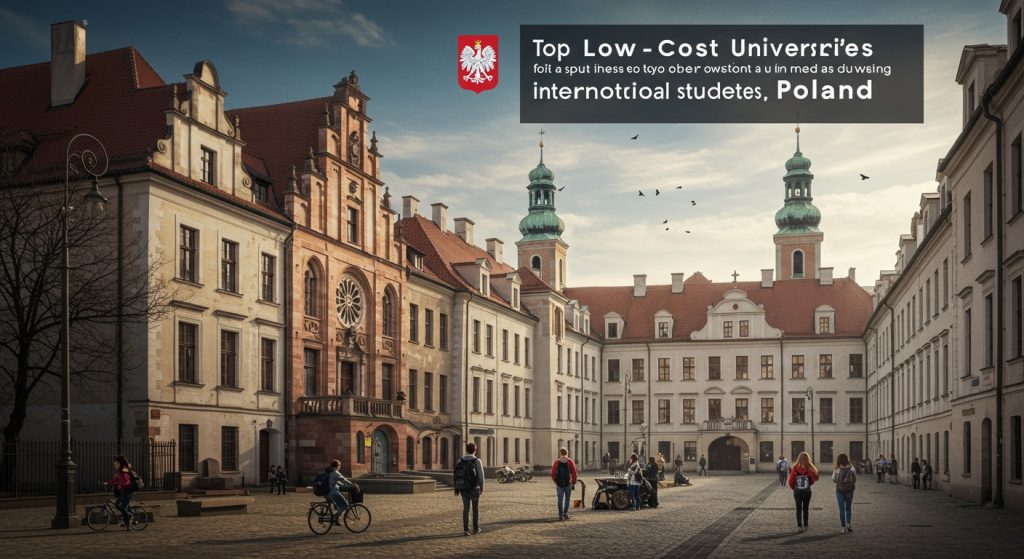Dreaming of a European education without breaking the bank? Poland’s higher education landscape is rapidly evolving, attracting international students with its quality programs and affordable tuition. We’re diving into the world of Polish universities that offer exceptional value. Explore institutions like the University of Warsaw and Jagiellonian University, known for their diverse programs and relatively low costs compared to Western European counterparts. We’ll highlight key factors influencing affordability, from tuition fees to living expenses, offering a clear picture of the financial commitment. Discover how you can access globally recognized education without compromising your budget.

Why Poland is a Great Choice for International Students
Poland has emerged as a popular destination for international students. For good reason. It offers a high-quality education at a fraction of the cost compared to Western European countries or North America. The Polish education system boasts a rich history and is constantly evolving to meet international standards. Moreover, the cost of living in Poland is relatively low, making it an attractive option for students on a budget.
One personal anecdote comes to mind: I met a student from India who chose Poland over the UK primarily due to the affordability. He was able to complete his Master’s degree in Engineering without accumulating a huge amount of debt. He even had enough left over to travel around Europe during his breaks.
Understanding Tuition Fees and Living Costs
When planning to study abroad, it’s crucial to comprehend both tuition fees and living costs. Tuition fees in Poland vary depending on the university and the program. Public universities generally offer lower tuition fees compared to private institutions. Also, programs taught in Polish are typically cheaper than those taught in English.
Living costs in Poland are significantly lower than in many other European countries. On average, students can expect to spend between €300 to €500 per month on accommodation, food, transportation. Other expenses. Cities like Warsaw and Krakow tend to be more expensive than smaller cities.
Top Public Universities with Affordable Programs
Several public universities in Poland offer quality education at reasonable prices. Here are a few noteworthy institutions:
- University of Warsaw: One of the oldest and most prestigious universities in Poland. It offers a wide range of programs in English, including humanities, social sciences. Sciences. Tuition fees for international students are competitive.
- Jagiellonian University: Located in Krakow, Jagiellonian University is another highly regarded institution with a long history. It offers various programs in English and Polish, focusing on research and academic excellence.
- Warsaw University of Technology: A leading technical university in Poland, offering a variety of engineering programs. The university has a strong international outlook and provides courses in English.
- Adam Mickiewicz University Poznań: Known for its strong humanities and social sciences programs. Located in Poznań, a vibrant and student-friendly city, the university offers several programs in English.
Private Universities Offering Value for Money
While public universities are often the first choice for budget-conscious students, some private universities in Poland also offer excellent programs at reasonable prices. Here are a couple of options:
- Kozminski University: Located in Warsaw, Kozminski University is a leading business school in Central and Eastern Europe. It offers a range of programs in English, including Business Management, finance. Law.
- University of Social Sciences and Humanities (SWPS): SWPS is a private university with campuses in several cities across Poland. It offers programs in psychology, law. Social sciences, with a focus on practical skills and career development.
Scholarship Opportunities for International Students
Several scholarship programs are available to international students who wish to study in Poland. These scholarships can help offset tuition fees and living costs. Some notable scholarship programs include:
- Polish Government Scholarships: Offered by the Polish government to students from specific countries. These scholarships usually cover tuition fees and provide a monthly stipend.
- Visegrad Fund Scholarships: For students from the Visegrad Group countries (Czech Republic, Hungary, Poland. Slovakia) and neighboring countries.
- University-Specific Scholarships: Many universities in Poland offer their own scholarships to international students based on academic merit or financial need.
It’s advisable to check the websites of individual universities and the Polish Ministry of Education and Science for the most up-to-date details on scholarship opportunities.
Application Process and Requirements
The application process for universities in Poland typically involves submitting an online application, providing academic transcripts, proof of English proficiency (such as IELTS or TOEFL scores). A copy of your passport. Some programs may also require an entrance exam or an interview.
It’s crucial to start the application process well in advance of the deadline, as obtaining a student visa can take time. The Polish embassy or consulate in your home country can provide data on visa requirements and the application procedure.
Navigating the Polish Student Visa Process
Obtaining a Polish student visa is a crucial step for international students. The process generally involves applying for a national visa (D-type) at the Polish consulate or embassy in your home country. You’ll need to provide various documents, including:
- Acceptance letter from a Polish university
- Proof of financial resources to cover tuition fees and living expenses
- Health insurance
- Criminal record certificate
The visa application process can be complex, so it’s advisable to start early and seek assistance from the university’s international office or a visa agency if needed.
Accommodation Options for Students
International students in Poland have several accommodation options, including university dormitories, private apartments. Shared flats. University dormitories are usually the most affordable option. They may have limited availability. Private apartments offer more privacy and independence. They are typically more expensive.
Many students choose to share flats with other students to reduce costs. Online platforms and social media groups can be helpful for finding flatmates and accommodation options.
Living in Poland: Culture and Practical Tips
Living in Poland as an international student can be a rewarding experience. Polish culture is rich in history and traditions. The people are generally welcoming to foreigners. Learning some basic Polish phrases can go a long way in making your daily life easier.
Here are some practical tips for living in Poland:
- Get a Polish SIM card: Mobile data and calls are relatively cheap in Poland.
- Open a Polish bank account: This makes it easier to manage your finances and pay bills.
- Learn about Polish cuisine: Polish food is hearty and delicious. Try pierogi, żurek. Kiełbasa.
- Explore Poland: Poland has many beautiful cities, landscapes. Historical sites to discover.
Career Opportunities After Graduation
After graduating from a Polish university, international students have several career opportunities. Poland has a growing economy and a demand for skilled professionals in various fields. Some popular career paths for international graduates include:
- IT: Poland has a thriving IT sector with many job opportunities for software developers, data scientists. IT consultants.
- Engineering: Graduates with engineering degrees can find jobs in manufacturing, construction. Energy sectors.
- Business: Students with Business Management degrees can work in finance, marketing. Consulting.
- Education: Teaching English as a foreign language is a popular option for international graduates.
It’s essential to research the job market and network with potential employers during your studies to increase your chances of finding a job after graduation.
Conclusion
Choosing the right university is a significant step. Finding one that aligns with your budget shouldn’t limit your academic aspirations. We’ve explored some fantastic, low-cost options in Poland. Now, the implementation phase begins. Remember to meticulously check the specific program requirements and application deadlines of your chosen universities. Don’t underestimate the power of networking; connect with current students or alumni online to gain firsthand insights into their experiences. Poland’s commitment to quality education at an affordable price makes it a compelling choice, especially with the increasing demand for skilled professionals in Europe. Success will be measured not just by your degree. By your adaptability and cultural integration. Consider learning some basic Polish phrases – it makes a big difference! By following these steps, you are well on your way to an enriching and affordable academic journey in Poland.
More Articles
Top Universities in Germany for Master’s in Data Science
Application Deadlines and Admission Requirements for Top Colleges in France
Affordable Engineering Colleges in India with Strong Placements
Top Architecture Schools in Canada with Focus on Sustainable Design
FAQs
So, I’m on a tight budget but REALLY want to study in Poland. Are there actually decent universities there that won’t break the bank for international students?
Absolutely! Poland is known for its relatively affordable tuition fees and living costs compared to many other European countries. You can definitely find good quality universities without emptying your savings account. Just be prepared to do your research!
Okay, great! But what kind of fees are we talking about? Is it just tuition, or are there sneaky hidden costs I should be aware of?
Good question! Tuition fees are the main chunk, of course. But remember to factor in application fees (usually small), possible visa costs, health insurance (required!). Accommodation. Living expenses like food, transportation. Textbooks also add up, so create a realistic budget beforehand.
Which Polish universities are generally considered ‘low-cost’ for international students? Can you give me a few names?
While it depends on your program, some universities often mentioned are public universities like the University of Lodz, Maria Curie-Skłodowska University in Lublin (UMCS). Some faculties within larger universities like Warsaw University of Technology. Keep in mind that costs can vary between programs and the language of instruction (Polish programs are often cheaper).
Do I need to speak Polish to study at these cheaper universities? Or are there English-taught programs available too?
Many universities offer programs in English, especially at the Master’s and PhD levels. You can definitely find low-cost options taught in English. But, learning some basic Polish will enrich your experience and make daily life much easier and cheaper!
Are scholarships available for international students studying at these low-cost Polish universities? Where would I even look for those?
Yes, scholarships are available! Start by checking the websites of the universities you’re interested in – they often have scholarships specifically for international students. Also, look into government scholarships offered by Poland or your home country. Don’t forget to check out organizations like Erasmus+ for funding opportunities.
What’s the catch? I mean, are these low-cost universities low quality? Will I be getting a dodgy education?
Not at all! Low-cost doesn’t necessarily mean low quality. Poland has a solid higher education system that’s undergoing modernization. While some universities might be better known internationally than others, many offer excellent programs and dedicated faculty. Do your research on specific departments and programs to find the best fit for you.
Besides tuition, what can I do to keep my costs down while living and studying in Poland?
Smart choices! Opt for student dormitories – they’re usually the cheapest accommodation option. Cook your own meals instead of eating out frequently. Take advantage of student discounts on transportation, entertainment. Cultural events. And, of course, explore free activities like parks, museums on free days. University events!



